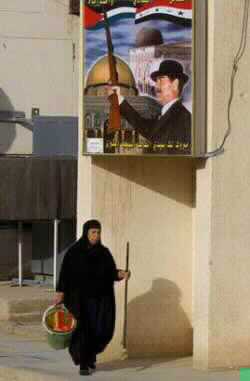At the request of the United States and Britain, the Security Council voted in favor of new restrictions on Iraqi imports Monday in an effort to prevent Baghdad from acquiring equipment that could be used in war. Russia and Syria abstained from the vote, arguing that the changes hurt deliveries of humanitarian goods to Iraq, which has been subject to international economic sanctions for more than a decade.
Earlier this month, the United States proposed adding dozens of items - including antibiotics, broadcast equipment and fast boats - to an existing list of dual-use goods that the United Nations must approve before they can be purchased by Iraq.
Some of the items on the list will be banned outright, while others could be imported only after extensive scrutiny by the United Nations.
The U.S. diplomacy and came after a month of intense lobbying efforts to beef up the existing 419-page "goods review list," of items which Iraq cannot automatically purchase.
Russia and France had been tough to win over from the start. Syria, Iraq's closest council ally, was not expected to support the resolution, which passed 13-0.
While Russian diplomats said they were open to changes, they also wanted some items removed from the list, including Russian-made heavy trucks. But the United States and Britain wouldn't yield, arguing that such trucks are being used by the Iraqi military.
Russian Ambassador Sergey Lavrov, in explaining his abstention, argued that the trucks were for civilian use only and that holding up such sales impacts sectors of Iraq's economy. He urged the council to allow such sales to go through in the future.
France objected to tacking on to the list antibiotic drugs such as Cipro - which was used to combat anthrax last year in the United States - and atropine. Over the past six years, the United States approved Iraqi purchases of 3.5 million doses of the heart drug, which officials now fear could be used to protect Iraqi soldiers using nerve gas.
In a compromise, the sides agreed to limit the ban to high doses of the drugs which could be used to combat biological and chemical agents.
The 13-page resolution circulated by the United States on Monday is broken down into sections regarding biological, chemical, missile and conventions.
Experts from the five permanent Security Council members - the United States, Russia, China, Britain and France - have been meeting throughout December to discuss the proposed changes to the goods review list. The U.S. effort has been spearheaded by U.S. Undersecretary of State John Bolton.
The resolution includes some 50 additions and changes the Bush administration and Britain proposed for the goods review list, which was crafted this summer to speed the delivery of humanitarian goods to Iraqi civilians. Under the U.N. oil-for-food program, Iraq is allowed to use proceeds from its oil sales to purchase humanitarian goods through a monitored system designed to spot any attempts to rearm.
Items with possible military applications must be approved by the Security Council committee that oversees sanctions imposed after Iraq's 1990 invasion of Kuwait. The sanctions cannot be lifted until weapons inspectors certify that Iraq is free of weapons of mass destruction.
The U.S. list, drafted with British help, also includes activated charcoal, a widely used industrial substance that could be used for chemical weapons, fast boats, specific tires, hydraulic lift systems, flight simulators and training systems and equipment that could be used to jam communications systems.
Beside adding new items to the list, the resolution gives the U.N. sanctions committee greater power to scrutinize each order and possibly single out suppliers deemed dishonest or uncooperative.
PHOTO CAPTION
A cleaner walks under a picture of Iraqi President Saddam Hussein at the al-Samood factory in Abu-Ghraib about 40 kilometers (25 miles) west of Baghdad Monday, Dec. 30, 2002, as U.N. weapons inspectors came to re-examine the site. The factory, which belongs to the Al Karama State Company, manufactures components for al-Samood missiles, which have a range of more than 48 kilometers (30 miles). (AP Photo/Dusan Vranic)
- Author:
& News Agencies - Section:
WORLD HEADLINES


 Home
Home Discover Islam
Discover Islam Quran Recitations
Quran Recitations Lectures
Lectures
 Fatwa
Fatwa Articles
Articles Fiqh
Fiqh E-Books
E-Books Boys & Girls
Boys & Girls  Hajj Rulings
Hajj Rulings Hajj Fatwas
Hajj Fatwas














